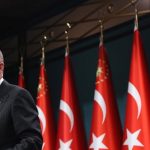Matteo Salvini addresses the World Congress of Families in Verona. Photograph: Filippo Monteforte/AFP/Getty Images
Vox and other extremists are making huge political gains for the first time in years. Their success risks tearing societies apart
I spent part of my childhood in Ankara and part of it in Madrid. Commuting between Spain and Turkey in the early 1980s was a strange experience. Spain had recently returned to democracy after years of dictatorship, and Turkey had experienced yet another military coup. Both countries were at the fringes of Europe, neither part of the EU. It was said that “Europe finishes at the start of the Pyrenees”, but if the mountain range between France and Spain was regarded as a border, another frontier was the waters of the Bosphorus. It often felt as though I was travelling from one end of Europe to the other.
The Spain that I experienced was vibrant, welcoming and warm-hearted. Despite the occasional pro-Franco mutterings of an older generation, Spainembraced democracy. How I wanted my motherland to follow suit. But one day, on my way to school, I saw something that made me stop in my tracks. All the walls down the street were plastered with posters of dead babies thrown into bins. I froze. The disturbing and distorted images had been distributed by an ultraconservative Catholic group that claimed family values were being attacked, women had gone too far in the name of emancipation. A patriarchal backlash still lurked under the surface. The culture wars were under way.
The recent general election has made that clear. For the first time since 1978, a far-right party is making huge gains. Vox managed to get 10.26% of votes. The party, founded in 2013, has become the fastest growing movement in the country. Political scientists once smugly assumed that there were countries in which fascism could never again raise its ugly head. Germany and Spain, having gone through its horrors, were thought to be immune to the false promises of the far right. But then came Alternative für Deutschland (AfD), and now Vox, to show us how wrong those assumptions were.
What Vox is selling is strikingly similar to the package embraced by populist nationalists elsewhere: anti-immigration, anti-diversity, anti-gay marriage and LGBT rights, an aggressive longing for a mythical golden past. The Catalan conflict has played into Vox’s hands – as through history, one type of “benign” nationalism has dangerously inflamed another to stoke a vicious conflict. Populist nationalists love imaginary enemies, and Vox is no exception. Misogyny lies at its heart. Talk that men are suffering at the hands of “feminazis”, and that radical feminists are threatening the social fabric, will be familiar to watchers of the far right. They don’t believe that patriarchy exists, just as they don’t believe climate change is happening. Coming from Turkey, the misogynist rhetoric of the Spanish movement is horribly familiar to me. Just like the Justice and Development party (AKP) in Turkey, Vox wants to convert the current gender ministry into a ministry of family. The shift in words is significant. Rather than looking at gender discrimination and institutional gender disparity, the new focus is on “traditional family values”. Until recently Spain was regarded as one of the few countries that had made huge gains in gender equality. Now we know that even in such countries history can go backwards.
The party spokesman Francisco Serrano, a former judge, has even claimed there is a genocide against men, citing high suicide rates as his proof. This is typical of the far right propaganda machine – exploiting a real problem (the pressures on young men, particularly those from disadvantaged backgrounds) for its own selfish political gains. Vox is not alone in this. Ultraconservative Catholic organisations, such as Hazte Oír (Make Yourself Heard), known for its vitriolic attacks against the transgender community, are providing full support for the anti-feminist backlash. This year it hired a bus with a picture of Hitler on it captioned, “It’s not gender violence, it’s domestic violence #StopFeminazis”, and drove it around cities ahead of International Women’s Day. The message, and the identity of “the enemy”, could not be clearer.
A far-right “family rights conference” has been held in Italy, where Matteo Salvini, deputy prime minister and leader of the rightwing League, was the keynote speaker. In his speech he lashed out against two groups: feminists and immigrants. Salvini thinks low fertility rate is an “excuse” for immigration and therefore, Italian women must produce more babies. He falsely accuses feminists of pretending not to see the danger of Islamic extremism, failing to explain why one cannot be a feminist and oppose all kinds of extremism simultaneously.
In Poland, members of the Law and Justice party talk about making the country “LGBT free”. Kacyzsinki claims gays are a major threat “not just for Poland but for entire Europe, for the entire civilization that is based on Christianity.” In Hungary, Viktor Orbán, who offers financial incentives to boost the birth rate, has banned gender studies in universities. In Turkey, President Erdoğan says “every abortion is an Uludere” (a mass murder in which 34 Kurdish civilians were killed by the Turkish army in an air strike), and views birth control as a conspiracy against the great Turkish nation. He calls women who do not have children “deficient”. “Strong families lead to strong nations, every member of the nation should be mobilised in the pursuit of ‘great goals’.”
It is paradoxical that this generation of populist nationalists leads the way on international political cooperation. They copy each others’ tactics, echo their policies (the new far right in Spain even wants to build a wall along the border between Morocco and Ceuta to keep refugees out), and they’re often seen sending each other warm messages of support. Salvini welcomed the results in Spain: “I hope to have Vox as our ally in the Europe we are building.” And that is exactly what they are doing: they are building Europe. Not a new Europe, not even an old Europe, but a Europe modelled on an imaginary, mythical past. A monolithic Europe dedicated to halting and reversing progress.
If anyone doubts the nature of the political shifts we are witnessing across the world, one need only look to the raging clashes outside of politics and in our culture, from comedians in France attacking minorities in their shows to rightwing mayors in Italy vilifying John Lennon songs for being too internationalist or leftist, from bans on halal meat in Belgium to Freedom Party in Austria suggesting all Jews must register with authorities if they want to eat kosher meat. Political scientists have for too long paid too much attention only to measurable data, forgetting that culture, hard though it might be to analyse, is just as vital.
In contrast to the predictions of the US academic Samuel Huntington, the world is not going through a “war of civilisations”. What we face is far more complicated and disparate. This is the age of a thousand cultural clashes, and these battles take place within countries, not between them. They tear our societies apart and polarise politics to such an extent that it will be for ever altered.
By Elif Safak
Source: The Guardian



